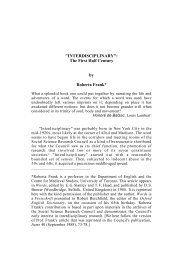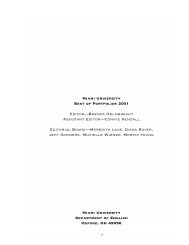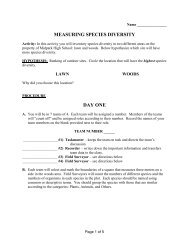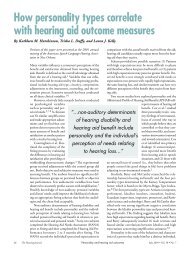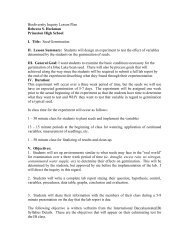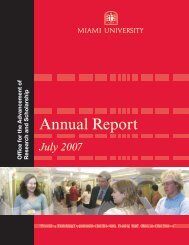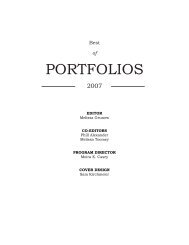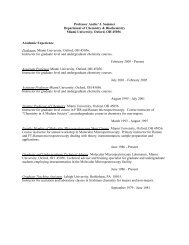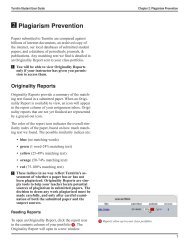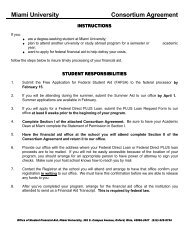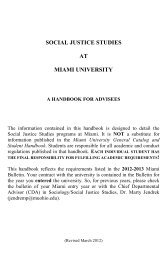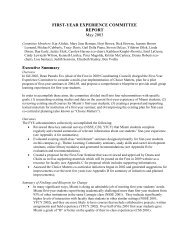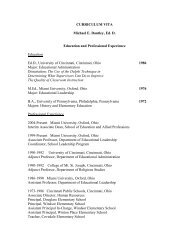Interdisciplinary Research Manual - Units.muohio.edu
Interdisciplinary Research Manual - Units.muohio.edu
Interdisciplinary Research Manual - Units.muohio.edu
Create successful ePaper yourself
Turn your PDF publications into a flip-book with our unique Google optimized e-Paper software.
9<br />
First, peruse some general reference works for articles on the overall subject<br />
matter you want to explore (let’s say, Cuba). The library’s collection of reference books,<br />
especially its encyclopedias and handbooks (both general and specialized), is a great<br />
place to find an overview of your topic that puts it in overall context. You won’t cite<br />
these sources in your project, but they are a great way to explore your general topic area.<br />
You could start with the On-line Reference Shelf and go to almanacs and encyclopedias,<br />
say to Encyclopedia Britannica. Search in it for Cuba and find the general article on<br />
Cuba.<br />
As you read about Cuba, you may discover that what interests you is really Cuban<br />
culture, so you next read in more focused reference works and realize that, for you, the<br />
most interesting part of Cuban culture is its music and how that relates to politics, etc.<br />
Now you can start looking for books on Cuban music. When you do, don’t search for<br />
books on Cuba and then search within them for books on music. That would work for a<br />
Caribbean studies scholar focused on Cuba, but not for an interdisciplinary studies<br />
scholar. Instead, use Boolean logic to search for the “intersection” of books on Cuba and<br />
books on music, i.e. Cuba “and” music. That way, you get works that approach Cuban<br />
music from two perspectives, region and music. If your search yields too many hits, you<br />
can limit your search to books in English and to those published in the last five years. At<br />
other points, you may want a broader focus, expanding your search from just music to<br />
cultural life in general; e.g., so that you can look at art as well as music by searching for<br />
art “or” music, and then searching for that set “and” Cuba. To further narrow your topic,<br />
you could do an advanced search under Grove Music On-line for Cuba to find different<br />
kinds of music as well as bibliographies.<br />
Refining the topic. To refine that topic—to narrow, focus, and shape your<br />
topic—you will need to work back and forth between general categories and specific<br />
examples as the information you find raises different questions in your mind. Think of<br />
this as a computer game: if you try something and it works, great; if not, back off and try<br />
something else. In the language of the Boolean logic used in advanced library computer<br />
searches, you do that by moving between “or” searches for the ‘union’ of two topics (to<br />
enlarge your scope) and “and” searches for the ‘intersection’ of two topics (to narrow<br />
your scope).<br />
Because your project is interdisciplinary, you will also need to go back and forth<br />
between two systems for classifying information, one developed by the disciplines and<br />
the other developed by librarians. The disciplinary system develops technical disciplinary<br />
terms used by authors in titles and abstracts, and it organizes information in disciplinespecific<br />
databases and indexes; you access it by using key word searches. The library<br />
system uses subject headings developed by professional librarians and organizes<br />
information in the card catalog according to call numbers also developed by librarians;<br />
you access it by using subject heading searches. The electronic card catalogs, databases<br />
and indexes tend to be set up by librarians while the publications they include are by<br />
authors writing largely within disciplines. The trick is to use each system to focus better<br />
in the other system, sometimes expanding your search and other times contracting it.<br />
Librarians should know which databases and indexes are most useful for your topic.<br />
Subject headings of books in a card catalog or articles in indexes are assigned by<br />
experts who read the books, decide what they are about, and assign them subject headings<br />
as well as call numbers. Those subject headings bring together works using different



